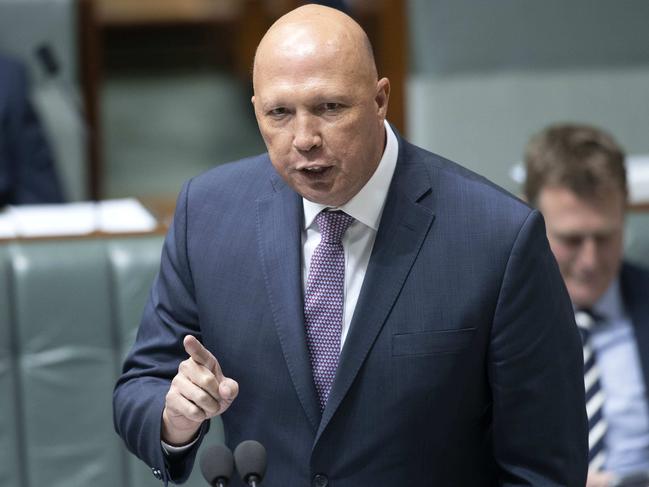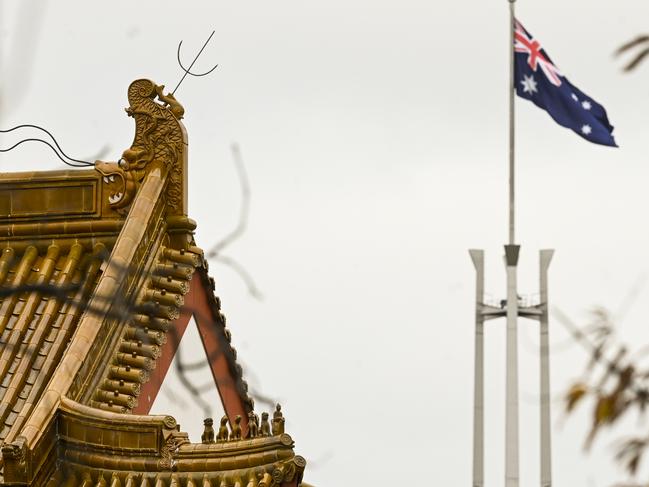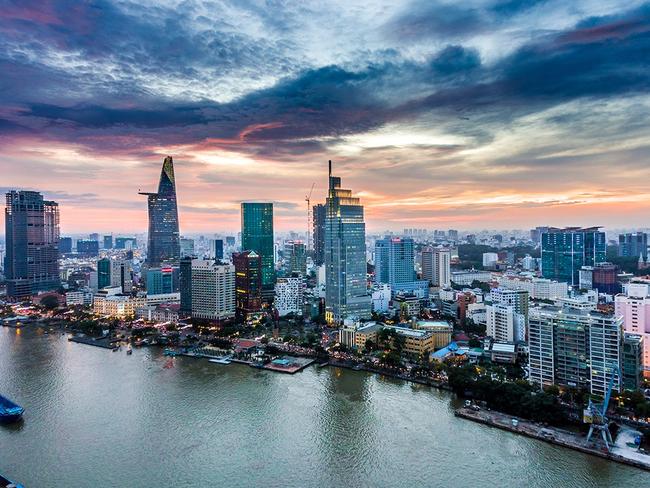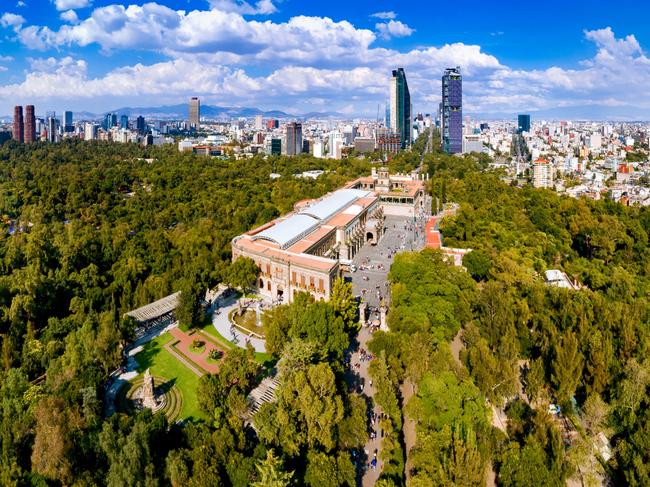Australia ‘won’t surrender’ as China warns of ‘serious pain’ after Belt and Road deals torn up
Peter Dutton has hit out at China, while Beijing has warned of serious consequences after two of Victoria’s Belt and Road deals were torn up.
National
Don't miss out on the headlines from National. Followed categories will be added to My News.
Australia will not “surrender” to threats of retaliation from China after Victoria’s Belt and Road deal was ripped up.
Defence Minister Peter Dutton issued the warning on Friday before pointing the finger at Premier Daniel Andrews for entering into an agreement that flew in the face of national interest.
“Dan Andrews did the wrong thing,” Mr Dutton told Today.
“We are not going to surrender our sovereignty.
“China and others need to understand that Australia is not going to be bullied.”

It comes as China warned it could “inflict serious pain” on Australia after the federal government tore up two Belt and Road Initiative agreements.
An editorial published in Beijing’s media mouthpiece, the Global Times, late on Thursday labelled Canberra “unhinged” for the move made by Foreign Minister Marise Payne.
Senator Payne torpedoed two agreements struck between Victoria and China back in 2018.
The state signed on to the $1.5 trillion global infrastructure initiative in the hope it would provide more jobs and economic opportunities for the state.
“Canberra must have known or even anticipated that its action would draw such a furious response and potentially crippling countermeasures from Beijing,” the editorial reads.
“However, it still decided to move ahead with the action. Clearly, Canberra is increasingly unhinged and in way over its head by taking such a suicidal attack on not just China but also its own economic interests.”
It also labelled Australia as “nothing more than a tiny sidekick of the US”, and warned the nation could face harsh action from China.
“Given the viciousness and seriousness of the move, we won’t be surprised if China takes forceful countermeasures to inflict serious pain on Australia,” it says.
“With China’s comprehensive strength, there are numerous ways for China to achieve that.”

Senator Payne on Thursday rejected the assertion that Australian producers should prepare for more retaliation from China – despite wine and barley producers being slapped with tariffs and customs issues with Australian seafood, coal and timber last year.
“Australia is operating in our national interests, we are very careful and very considered in that approach,” she said.
“It’s about ensuring we have a consistent approach to foreign policy.”
The editorial also warned the federal government may have no luck resolving the trade dispute the began last year, which started after Canberra pushed for an independent investigation into the origins of COVID-19.
“Just last week, media reports said that Australian businesses are eager to address their trade woes by planning to send a high-level trade mission to China as soon as international travel restrictions are lifted,” it says.
“Perhaps rather than preparing for a trip to China, they should pay more attention to how their government is undercutting them and how it plans to help them, because the door to resolving disputes with China may have been shut by their government for the foreseeable future.”
But should the two nations remain at loggerheads, there are other countries Australia can look to build on trade relations with.
Here are some promising options:

VIETNAM
The Department of Foreign Affairs and Trade (DFAT) places Vietnam as Australia’s fourteenth largest trading partner, with $15.5 billion worth of goods and services exchanged in 2019.
While a far cry in dollar terms from the nations relationship with China, the Australian Trade and Investment Commission regards the Communist nation as one of Australia’s fastest-growing trade markets in the ASEAN region, averaging 11.9 per cent in annual growth.
An analysis by research group IBISWorld found mining and mineral exports from Australia to Vietnam had surged over the past five years.
Coal exports totalled $2.2 billion in 2019-2020 after surging at an average rate of almost 90 per cent a year in the five years prior.
Iron ore exports also jumped to $776 million in 2019-20 after being non-existent in the preceding five years.
“Vietnam’s general economic success revolves around its strengths as a manufacturing economy, which highlights the need for Australia to focus on expanding its natural resource exports, such as food, minerals and metals, to Vietnam,” IBISWorld Senior Industry Analyst, Matthew Reeves, said.
INDIA
Currently Australia’s eight-largest trading partner (based on two-way trading of $30.3 billion of goods and services in 2018-19), Canberra believes its economic relationship with India can continue to grow.
DFAT predicts that as India continues to grow over the next 20 years, it will require more of Australia’s goods and services, including agriculture, education, skills training and healthcare.
It points to last year’s elevation of Australia and India’s bilateral Strategic Partnership to a Comprehensive Strategic Partnership as having laid solid groundwork to grow the trade and economic relationship between the two countries.
Despite being hit hard by the coronavirus pandemic, the International Monetary Fund expects India will bounce back and that its GDP will grow at 12.5 per cent over the year to April 222.
The country is also hungry for coal. Australia typically supplies around 4 per cent of India’s thermal coal, but in January and February, this jumped to almost 20 per cent, according to IBISWorld.
“Australian mineral exports may have more potential than food exports in India, due to the structure of the Indian economy,” Mr Reeves said.
“India’s large agriculture sector, including the number of jobs it supports, means substantial tariff reductions on those goods may be a sticking point in future trade negotiations.”
INDONESIA
Agricultural products, crude petroleum and manufactured goods are among the most important items in Australia’s trade relationship with Indonesia.
The world’s third largest democracy is Australia’s 13th largest trading partner with two-way goods and services trade with Indonesia worth $17.7 billion in 2019, according to DFAT.
Australia and India also entered a Comprehensive Economic Partnership agreement last year, which is expected to open up new markets and opportunities for businesses, primary producers, service providers and investors.
This was on top of the ASEAN-Australia-New Zealand Free Trade Area both countries signed up to in 2010.
Both agreements have helped expand beef and sheep meat exports, and have seen tariffs either eliminated or significantly reduced, according to IBISWorld.
“Indonesia’s large population, growing middle class and close geographic proximity will likely make it a key destination for Australian exporters going forward,’ Mr Reeves said.
“This includes greater demand for food, such as meat, dairy and grains, and for construction materials such as iron and steel.”

MEXICO
Despite accounting for less than 1 per cent of Australia’s exports, Mexico holds significant opportunity.
The Latin American nation became an alternative market for Australia’s barley industry after China hit the local sector with tariffs. Given it is also an emerging manufacturing economy, some of Australia’s key opportunities may lie in minerals and food, according to IBISWorld.
Mexico is also among 11 countries, including Australia, that have signed on to the Comprehensive and Progressive Agreement for Trans-Pacific Partnership.
“Ongoing tariff reductions as a result of this agreement will likely bolster Australia’s economic relationship with these countries. While China accounts for under 20% of the world economy, it makes up 40 per cent of Australia’s total exports, meaning there is significant room for Australia to diversify,” Mr Reeves said.
Originally published as Australia ‘won’t surrender’ as China warns of ‘serious pain’ after Belt and Road deals torn up




